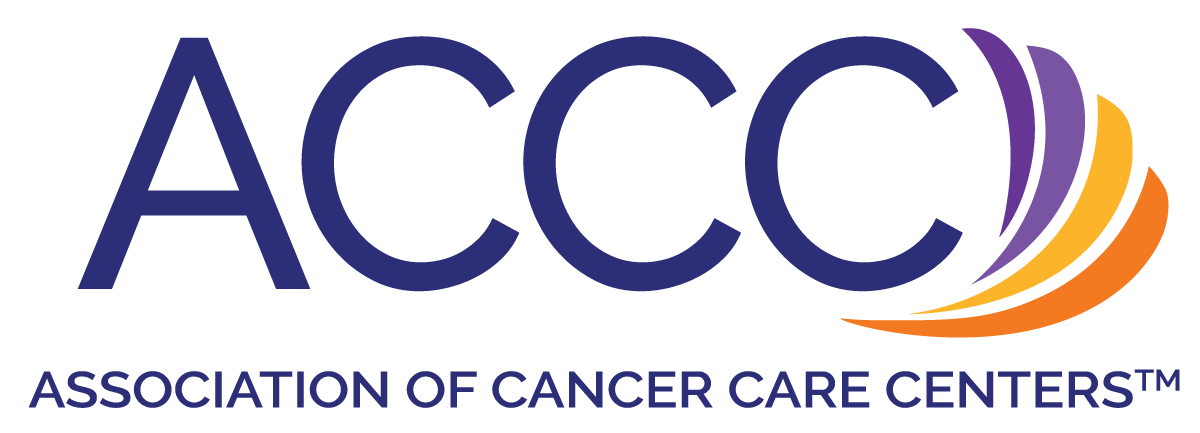
ACCC Meeting and Summit Prepares Stakeholders for Transformations in Cancer Care

The Association of Community Cancer Center's 45th Annual Meeting and Cancer Center Business Summit prepares oncology stakeholders for dramatic transformations in cancer care delivery.
In today’s competitive oncology marketplace, staying productive and economically viable remains a significant challenge. Key stakeholders together with business, finance, and policy thought leaders will come together to share their perspectives on the future of cancer care delivery and offer new ways to approach the challenges facing programs and practices.
What: Association of Community Cancer Centers 45th Annual Meeting & Cancer Center Business Summit
When: March 20-22, 2019
Where: Renaissance Washington, DC Downtown Hotel
Featured Sessions
Sessions will tackle programmatic challenges and inspire new ways of approaching the critical demands of an evolving cancer care landscape. General sessions will offer novel approaches to forecasting—and navigating—shifts in oncology; breakout sessions will provide strategic insights; and new this year, case studies will spotlight effective practices that have measurably improved program operations, patient care, and staff satisfaction.Cancer Care’s Future Physician, Nurse, and Administrator: 2020-2030
Joe Flower, Healthcare Futurist
Value-based care models center on improving patient outcomes, reducing healthcare costs, and rewarding for efficiency and effectiveness. Joe Flower will share how physicians, nurses, and administrators need to grow and adapt within the next 10 years to help their cancer program or practice successfully address emerging business, quality, technology, and policy trends.
The Future Cancer Service Line
Allen S. Lichter, MD, FASCO, TRG Healthcare
In this increasingly competitive healthcare environment, innovative approaches are imperative to enable health systems to grow their market presence. Dr. Lichter will explore the future direction of oncology services and how they will be influenced by trends in artificial intelligence, predictive analytics, telehealth, marketplace forces, and federal policies.
A Look into the Crystal Ball: Impact of Federal Policy on Cancer Delivery
Amy Bassano, Center for Medicare & Medicaid Innovation
This session offers an “Inside the Beltway” look at federal policy shifts that have the potential to shake up the cancer care delivery system, reimbursement, and patient access to care for years to come. A broad view of the cancer care landscape will examine the government’s role—and response to—the changing healthcare landscape and the implications for consumers of care. Organizational Imperatives for the Delivery of Cancer Care
Moderator: Michael Kolodziej, MD, FACP, ADVI
Roger Brito, DO, AETNA
Russell Gollard, MD, OptumCare Cancer Care
Harlan Levine, MD, City of Hope
Erich A. Mounce, MSHA, OneOncology
Barry Russo, Center for Cancer & Blood Disorders
Deirdre Saulet, PhD, The Advisory Board Company
Donald L. “Skip” Trump, MD, FACP, Inova Schar Cancer Institute
This multi-stakeholder panel—representing care setting vantage points—will share perspectives about remaining productive and economically viable given the growing number of administrative, economic, technological, and staffing constraints. Panelists will also reveal how providers can optimize their performance to support the goals of their organization, the similarities and differences between these delivery care settings, and ways to respond to deliver the highest value patient care and promote fruitful partnerships.
Breakout Sessions
The Power of Creativity to Impact & Engage Cancer Communities Joanie Mayer Hope, MD, Alaska Women’s Cancer Care; Providence Alaska Cancer Center and the Alaska Native Medical Center As part of a multifaceted national campaign blending the creative arts, medicine, and technology to raise awareness and resources for ovarian cancer prevention, Dr. Hope will debut her new music video ANY MOUNTAIN—a hip hop journey through ovarian cancer.The Digital Health Revolution of Tomorrow
John D. Halamka, MD, MS, Beth Israel Deaconess Health System
Pulling from Dr. Halamka’s experience gained from traveling 400,000 miles each year to meet with government, academic, and industry leaders to discuss trends in digital health, this session will offer insights into the latest innovations and health information technology breakthroughs most likely to come in the next 18 months
NextGen Practice Management
Hospital-Oncologist Alignment: What Works and What Doesn’t
Deep Dive Workshops
Drug Pricing and Reimbursement IssuesSafe Passage to Oncology Risk
Structuring and Optimizing Jointly Held Cancer Centers
Valuing and Structuring Oncology Practice Acquisitions and Compensation
CASE STUDY: Realizing the Promise of Value-Based Care: What OCM Performance Data Can Tell Us About the Road Ahead
Clinically Integrated Networks and Accountable Care Organizations
The Intersection of Digital Health, Technology, and Value
Interactive, bi-directional learning on hot button issues in the delivery of cancer care. Participants will define, dissect, and brainstorm on identified challenges and opportunities.
Leveraging Technology to Improve Patient Education and Track Engagement
Clinician Resiliency and Workforce Issues
Strategic Partnering Options for Oncology Providers
March 20 Capitol Hill Day
March 20 Pre-Conferences
Real World Immuno-Oncology: A Multidisciplinary Look at Survivorship, irAEs, and Step TherapyAs healthcare continues to undergo a wave of radical change, ACCC members will meet with legislators to advocate for improved research funding, greater access to quality healthcare, and payment reform. Congressional meetings will provide an opportunity for members to share their stories with lawmakers and help them better understand the realities and challenges of cancer care delivery in their community.Radiation Oncology Explores forward-thinking strategies necessary for supporting radiation oncology program viability and innovation. Sponsored by Alliance Oncology. Surgical Oncology Examines three cases studies, including the drivers and obstacles, costs, and effective practices for integrating surgical services into the larger cancer care delivery framework.




































